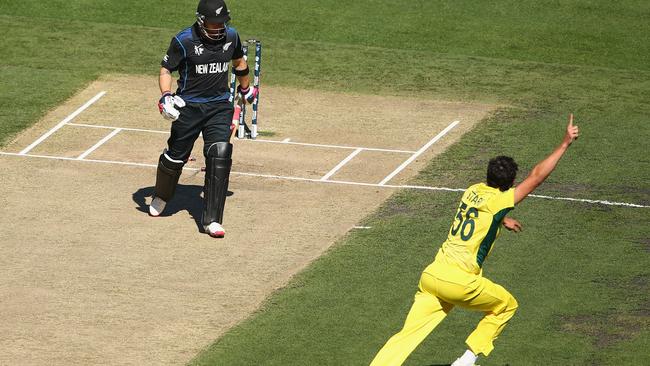Ashes 2023: Like ‘Baz’, England will have good crack

New Zealand’s captain had laid waste to one attack after another in that tournament; his fortunes looked likely to shape the climactic match.
McCullum grunted assent, Mitchell Starc stormed in, and the latter yorked the former with his third ball. New Zealand recoiled; Australia surged; the match almost condensed to that first contest.
So while Starc, Steve Smith, David Warner and Josh Hazlewood may be yet to experience the full withering blast of Bazball, they can claim to have seen off a brush with an earlier version, where the harder they swung, the bigger they fell.
Eight years on, the approach of throwing a gauntlet down against Australia will again be on trial, with McCullum now a plotter – a fine cricketer and shrewd thinker who, nonetheless, was only once in 16 Tests against Australia on the winning side.
England’s commitment is bound to outlast New Zealand’s that fateful day.
This, arguably, is the point to it: the attack comes in waves rather than spasms; it does not hold back; it does not wait its turn.
But it has been intriguing to watch their Ashes rival assimilate this new dash of the old enemy over the last year, in which Ben Stokes’ Englishmen have carried all before them on the Test field. For Australia remains the last refuge of the Bazball sceptic.
In the early days of England’s risorgimento, if you recall, McCullum himself scorned mention of Bazball, averse to the notion he had somehow personally mandated it.
Gradually he has relaxed his objection, partly because there’s no catching a media hare once it has started running, partly because it has value as an expression of collective purpose, a combination of brand and mission statement.
Its attractiveness is as obvious as Danny Blanchflower’s immortal lines, which apply to cricket as well as football: “The game is about glory, it is about doing things in style and with a flourish, about going out and beating the lot, not waiting for them to die of boredom.”
Who would not wish to fall in with such an ethos? Especially when it is cast in the image of a cricketer, Stokes, so compelling and so beloved.
But its appeal against Australia is doubly obvious. For Australia’s factory setting is a kind of earthy audacity, which Fred Spofforth and Billy Murdoch would surely have christened OzBall had the Victorian age understood the power of a hashtag.
Sir Leonard Hutton summed Australian teams up so: “They have the utmost ability for producing that little extra, or instilling into the opposition an inferiority complex that can have and has had a crushing effect. Australians have no inhibitions.”
What sport to turn the tables on England’s eternal tormentor with cricket similarly uninhibited.
All the same, it is not quite the same, is it? Australian aggression has tended to be anterior to results. That combination of steamroller and parade float driven by Mark Taylor and Steve Waugh in the nineties and noughties gradually expanded their attacking ambitions from a base of success.
England has come to a new way of thinking only after experiencing failure every other way, a similar process of elimination to Dorothy Parker: “Guns aren’t lawful; nooses give; gas smells awful; you might as well live.”
Thus a nagging Australian sense that England has fallen for a kind of cryptocricket – new and exciting but meretricious and ultimately unsound.
When your top three are David Warner, Usman Khawaja and Marnus Labuschagne, it is tempting to regard Ben Duckett, Zak Crawley and Ollie Pope as Logan Roy did his offspring – “not serious people”.
The Australians have deflected Bazball questions so far on tour, politely but guardedly.
“So, you know, they’ve obviously done well against other attacks,” said Smith a couple of weeks ago. “But they haven’t come up against us yet.” Likewise Starc: “If they are 5 for 50, are they still coming out and swinging? Dunno.”
Last week, Waugh himself, progenitor of the 400-run Test day, pitched in: “That is the big question mark over so-called Bazball. What is Plan B? Have they got a Plan B? If they haven’t then they are going to be found out.”
I loved that grudging “so-called”, and the recommendation of a Plan B from a skipper who seldom needed to vary his rinse-and-repeat Plan A.
Australian teams coming to England have been overconfident before, notably in 2005 and 2015. There is enough common sense in this group not to succumb to the same vice: they are the first to point out Australia’s failure to win an away Ashes outright since 2001, which provides them with their own sense of mission.
But England’s recent mantle as Test cricket’s pacesetter will be a challenge to Australian amour propre, and they will seize on the first evidence of it fraying at the edges.
They will relish succeeding against it; they will certainly not wish to be seen as giving in to it. And they certainly won’t need to ask whether England will be having a crack.



“You going to have a crack today?” asked Australia’s Brad Haddin as Brendon McCullum took guard in the 2015 World Cup final at the MCG.